Experiences of participating in the 100,000 Genomes Project
Overview
Experience of participating in the 100,000 Genomes Project - site preview
Experience of participating in the 100,000 Genomes Project - site preview
Rebecca
My understanding is that they are looking for various genes that could cause cancer and possibly other diseases that we don’t know about yet. We know about some, the BRCA1 gene and various others, but, but there will be others that we haven’t discovered. And only by getting lots of people together and examining their blood or their DNA, we can find out what’s the same in each of them that’s the common, common cause, if you like. And when we know that, we can then develop treatments that are particular, that will help that particular person more than a more general treatment. And I think things are going very much with, that way even in breast cancer. Some people are having slightly different treatments because they have a slightly different DNA and the breast cancer is slightly different. So, they have a more tailored, a more sort of, different treatment to what I’ve had. And we only know that by research and looking at other, other people’s DNA.
Nick
The best thing that could come out of it, you could have a wonder treatment that could happen. I know that’s highly unlikely. But at least it’s there to help further genetic research. It’s there to help you and the future generations. Yeah.
Vanessa
While I was waiting to go and have my pre-meds tests, I had a nurse come up to me and ask me if I would be interested in the genome project. Not knowing what it entailed, I said that - you know - I didn't want to go through any trial drugs, and she assured me that no, there wouldn't any of that, it was purely - you know - to have some bloods taken, and experiences of, of treatments, really. And so I said yes, I would. If it helps someone else along the line, that's what we have to do.
Aileen
So, the tissue that is used. It was very easy. Any donation I had to make of blood tissue was very easy because the tissue was taken during operations when I knew very little about it. And they were taking tissue anyway. As far as I know no additional tissue was taken. It would be, you know, it was what was taken anyway for pathology. So, and I was under anaesthetic so it didn’t affect me.
It does, it does state that results of the research will be used commercially. But again that’s what this is all about. And there is no use doing some research in genetics if then the companies that can do something about the treatments don’t get that information. So, for me that was part of the process and part of the, part of being involved and the purpose of the study. So, I think if you consent to being part of the Genome Project you have to realise that it will be used commercially. Your information will be used but as part of the group and anonymised (de-identified) and one of the 100,000 people rather than who I am, where I am and.
So did you have any worries about it?
No, I didn’t have any worries about how my information would be used.
In this section, you can see and hear people share their personal stories of participating in the 100,000 Genomes Project. We talked to 32 people about their experiences of genomics research, in particular their experiences of taking part in the 100,000 Genomes Project. People we interviewed had not yet had results from the project.
The 100,000 Genomes Project is a flagship project that aims to sequence 100,000 whole genomes from NHS patients with rare diseases, and their families, as well as people with common cancers. A few of the people we interviewed took part in earlier pilot studies before being transferred to the main project.
Here, you can find out what people said about being asked to take part in genomic research, their reasons for taking part, the concerns they had, and their expectations for the future.
Copyright © 2024 University of Oxford. All rights reserved.



